Adrian Collins's Blog, page 110
January 13, 2023
REVIEW: Call of Cthulhu
Call of Cthulhu (2018) is a roleplaying survival horror game developed by Cyanide and published by Focus Home Interactive. Initially, the game was supposed to be created by Frogware Games, which created the Adventures of Sherlock Holmes (including one where the Great Detective investigates the Cthulhu Mythos). They had the game taken from them and, ironically, ended up making their own Lovecraft game with the upcoming The Sinking City.
The game was moved into production in 2016 and this means it had a roughly two-year development cycle, probably less, which I’m going to comment on. Call of Cthulhu’s roleplaying game (as well as its spin-offs) is a franchise that I am deeply in love with and have loved for literal decades. I’ve never been quite the fan of the tabletop RPG as some (being more a Vampire: The Masquerade and Star Wars D6 fan) but I’ve always appreciated its existence.
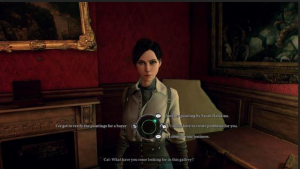
Chaosium’s Call of Cthulhu is arguably the greatest legacy of August Derleth (and arguably Lovecraft himself). Famously, August Derleth re-wrote a lot of H.P. Lovecraft’s fiction and reformatted them as conflicts between good vs. evil. While the folks at Chaosium dialed back some of his sillier notions, their version is fundamentally a game about fighting the Mythos. Whether with Tommy guns, spells, or dynamite–you can do some damage against the Unnameable.
H.P. Lovecraft only had that be true in a few of his works (The Dunwich Horror, The Strange Case of Charles Dexter Ward, and The Thing on the Doorstep). You could never stop Cthulhu but you could possibly delay him from ending humanity for another day. Call of Cthulhu is ostensibly as an adaptation of the pen and paper game like the previous Call of Cthulhu: Dark Corners of the Earth.
So is it any good? I very much enjoyed it but this is going to be a review with a lot of caveats. Call of Cthulhu is a good game but it’s not a great game and it’s disappointing because you can see this could have been a great game. It’s a game which suffers from dated graphics,
inconsistent gameplay, confusing storytelling, and (most of all) a complete lack of scares. Call of Cthulhu is a horror game that fails to achieve anything resembling creeping dread and that’s a shame because it really looked like they had something here–it’s just lost in a sea of other ideas.
The premise is as follows: Edward Pierce, private detective and WW1 veteran, is hired by the father of a famous painter named Sara Hawkins. Sara is a minor celebrity with a reputation for painting surrealist paintings that are vaguely disquieting. She’s accused of burning down her house with her child, husband, and self inside. Sara’s father wants to exonerate his daughter and sends Edward off to Darkwater Island off Boston to do it.
What follows is a rather predictable collection of events with the island being controlled by an evil cult, a plot to bring something dark and nasty into reality, an asylum section, and a sanity meter. There’s even a shooting section which feels totally out of step with the game and hurts the narrative.
I really wanted to like this game but it jumps out and yells “SURPRISE!” way too early. It’s about twenty minutes into the game that you’ve already found the secret temple to the world’s most famous Great Old One and what his worshipers are up to. There’s really nowhere to go from there and the rest of the game struggles to catch up on the fact Pierce knows the secret of the island for the majority of the game.
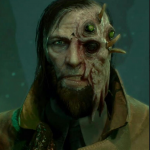 The game has some really good elements to it and I love the characters of Cat Baker, Marie Colden, and the posthumous Sarah Hawkins. I don’t like switching to their perspectives, which takes us out of the perspective of Edward Pierce too often, but I enjoyed interacting with them. I really wanted to do more interaction and investigating with the locals but there’s not really much chance to roleplay or investigate in the game. It’s all very linear but takes the illusion of being open-world when I think a more Telltale Games or Life is Strange format would have benefited the story.
The game has some really good elements to it and I love the characters of Cat Baker, Marie Colden, and the posthumous Sarah Hawkins. I don’t like switching to their perspectives, which takes us out of the perspective of Edward Pierce too often, but I enjoyed interacting with them. I really wanted to do more interaction and investigating with the locals but there’s not really much chance to roleplay or investigate in the game. It’s all very linear but takes the illusion of being open-world when I think a more Telltale Games or Life is Strange format would have benefited the story.
Gameplay wise, the game mostly consists of wandering around small levels looking for clues and talking to people. The stat sections leftover from the tabletop roleplaying game sometimes add a new line of dialogue or option but not enough really justify the EXP point section of the game. There’s a number of stealth sections and the aforementioned shooting one but not so much that it really feels like a game you can honestly lose. Indeed, the most tense section of the game is where you have to play tag with the Dimensional Shambler as Sarah Hawkins (who appears via flashback) and one of the few scenes with any real edge.
It’s weird to say it but the game’s best sections are not the Cthulhu-related ones. The story is most entertaining when you’re talking to Cat Baker the Bootlegger, Marie Colden is investigating horrible afflictions she doesn’t realize are tied to the Mythos, or when you’re dealing with a haunted art gallery instead of the Cult of Cthulhu. These elements set up in the 1920s feel more authentic and give a sense of stakes to the horror that is otherwise absent. The fear of the Mythos is the fear of the unknown and too much of this is a theme park ride of Lovecraft’s greatest hits.
In conclusion, I think this was a decent enough game but I believe it needed a more coherent rewrite and a focus on tension. Edward Pierce can lose SAN but it’s almost impossible to die in the game save in a few locations and there’s not much of a chance to play on the game’s strength by talking with people. I wonder what would have happened if they’d re-written the game episodically with Edward Pierce slowly finding out about the evils of the island.
The post REVIEW: Call of Cthulhu appeared first on Grimdark Magazine.
January 12, 2023
REVIEW: Blade Runner 2039 #1 by Mike Johnson, Mellow Brown (W), Andres Guinaldo (A)
Following the stunning, action-packed run of Blade Runner 2029, we return to the seminal dystopian setting with Blade Runner 2039 and to be honest it feels like I never left—a lot of that thanks to the original creative team still being behind the wheel. In the ten years since the previous city, much in the crumbling dystopia has changed and little of it better for the inhabitants of future Los Angeles—especially the replicants. The blade runners are a fully organized force at this point, and their newest member is in fact a replicant herself: a cold, calculating and brutally efficient hunter named Luv created and designed to take down her own kind.
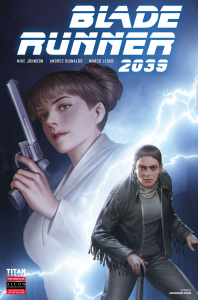 Blade Runner 2039 feels very much like a new chapter of the previous story, which itself feels like a piece of a larger whole that has been being built for the last few years, all of it expanding on the original Blade Runner universe and fleshing it out, expanding on the metaplot and history. If the original movie weren’t somehow immersive enough, Blade Runner 2039 and its various sister series so fully explore the world of the dark future it’s easy to find yourself getting lost in it.
Blade Runner 2039 feels very much like a new chapter of the previous story, which itself feels like a piece of a larger whole that has been being built for the last few years, all of it expanding on the original Blade Runner universe and fleshing it out, expanding on the metaplot and history. If the original movie weren’t somehow immersive enough, Blade Runner 2039 and its various sister series so fully explore the world of the dark future it’s easy to find yourself getting lost in it.
As far as a first issue goes, Blade Runner 2039 #1 does everything a first issue needs to do: it sets the tone (bleak and gritty), it introduces us to some new characters and a some of the powers that be, it shows us that the world is still on a seemingly terminal track to an existential nightmare, and, right at the end we get a glimpse of some major connective tissue that ties it in to the previous Blade Runner comics that is very cool especially if you read and were a big fan of the previous series.
All in all, Blade Runner 2039 promises to be another exciting exploration of one of the coolest settings in pop culture history, and even with the first chapter is an engrossing story I can’t wait to read more of. Titan is seriously on the ball with their comic game lately, and Blade Runner 2039 is a prime example of what they can do and how they’re shaping up to be a force to be reckoned with. So, if you’re a fan of the original property or just want to sink your teeth into some hardboiled science fiction, Blade Runner 2039 comes highly recommended.
Read Blade Runner 2039 #1 by Mike Johnson, Mellow Brown (W), Andres Guinaldo (A)The post REVIEW: Blade Runner 2039 #1 by Mike Johnson, Mellow Brown (W), Andres Guinaldo (A) appeared first on Grimdark Magazine.
January 11, 2023
REVIEW: Untamed Shore by Silvia Moreno-Garcia
Silvia Moreno-Garcia is the most versatile writer out there right now. After giving us horror (Mexican Gothic, see our review here), vampires (Certain Dark Things) and retellings (The Daughter of Doctor Moreau, see our review here), to list just a few, she has turned her talents to the darker side of the human psychology. Untamed Shore is a noir set in Baja California in 1979, in which eighteen-year-old Viridiana gets pulled into a tangled web of lies and constructed identities when she takes a job as an amanuensis for a visiting American family. Drawn in by their glamourous lifestyle, she is prepared to defend her new friends when one of them suddenly dies – but then, Viridiana has to reckon with who she is becoming and her role within this web.
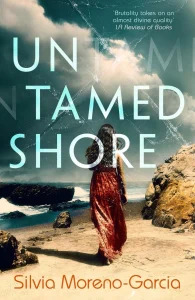 My favourite thing about Moreno-Garcia’s work is that every single one of her books is something completely new. They are all excellent examples of their own genre, and her own style takes a backseat to her versatility. I don’t think I could say that there is a red thread I’ve been able to identify across her work. And Untamed Shore is no different. It is an excellent noir, a psychological novel playing with self-perception and the hopes and dreams of a young girl growing up in a small fishing town in Baja California in the 1970s. It is a dark and twisted book, its horror lying in the reader seeing morality unraveling in front of them. A story in which hope is the catalyst for what may be called a grimdark ethos. And – even if this is a quiet book, one that doesn’t shout its darkness from the rooftops – what could be more grimdark than that? Hope and dreams ultimately being cause for moral downfall.
My favourite thing about Moreno-Garcia’s work is that every single one of her books is something completely new. They are all excellent examples of their own genre, and her own style takes a backseat to her versatility. I don’t think I could say that there is a red thread I’ve been able to identify across her work. And Untamed Shore is no different. It is an excellent noir, a psychological novel playing with self-perception and the hopes and dreams of a young girl growing up in a small fishing town in Baja California in the 1970s. It is a dark and twisted book, its horror lying in the reader seeing morality unraveling in front of them. A story in which hope is the catalyst for what may be called a grimdark ethos. And – even if this is a quiet book, one that doesn’t shout its darkness from the rooftops – what could be more grimdark than that? Hope and dreams ultimately being cause for moral downfall.
Moreno-Garcia has a talent for drawing complex characters, ones that surprise you at every turn. Untamed Shore is Viridiana’s story, yes, but Daisy, Ambrose and Gregory, her Americans, are no less vividly written and come to life in bursts and sparks, at once exciting and mysterious, and perhaps a bit dangerous from the start. Because what could be more enticing to a young girl trying to escape her small (shark) fishing town than a bit of danger…
I truly enjoyed reading Untamed Shore. While it is a slower paced novel, the focus on atmosphere and character development make it a compelling one. Moreno-Garcia once more draws the reader into her Mexico and presents a rich and vivid world. Untamed Shore may not be an obvious choice for a grimdark reader, but with its psychological focus and character arcs it is one that has much to appeal to the grimdark audience.
Read Untamed Shore by Silvia Moreno-GarciaThe post REVIEW: Untamed Shore by Silvia Moreno-Garcia appeared first on Grimdark Magazine.
January 10, 2023
REVIEW: The Wolf Among Us
The Wolf Among Us is, in my opinion, Telltale’s best game. This is a controversial opinion because most people tend to point to The Walking Dead as the best game. It’s a close tie but I believe the adaptation of Bill Willingham’s Fables is the better of the two for a variety of reason. I also admit to personal bias as I am a huge fan of noir detective stories and sleazy, dark, and depraved stories of the Big City.
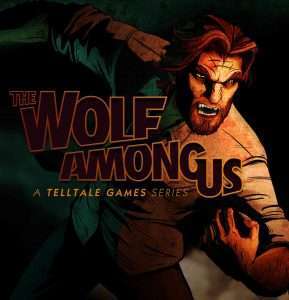 The premise is that Bigby Wolf is the Big Bad Wolf of nursery rhyme legend. Transformed into a human being by magic (at least to an extent–he’s closer to a werewolf or wolfwere in this case), he inhabits Fabletown in New York City. The very short version is that a lot of nursery rhyme characters have fled from fairyland to escape some disaster and live as refugees in our world while keeping themselves secret from the public at large. A good joke would be that New York City is the only place this could happen as a four-foot-tall toad man is something that will only draw the most cursory of stares.
The premise is that Bigby Wolf is the Big Bad Wolf of nursery rhyme legend. Transformed into a human being by magic (at least to an extent–he’s closer to a werewolf or wolfwere in this case), he inhabits Fabletown in New York City. The very short version is that a lot of nursery rhyme characters have fled from fairyland to escape some disaster and live as refugees in our world while keeping themselves secret from the public at large. A good joke would be that New York City is the only place this could happen as a four-foot-tall toad man is something that will only draw the most cursory of stares.
Bigby is the Sheriff of Fabletown, and it is his job to keep all of the fables in glamour protecting their identities, sort out the various issues among them, and generally do the job that a policeman in a small town should do. It’s just it is a small town in a very large town. He answers to Snow White, Ichabod Crane, and the unseen Mayor of Fabletown. Theoretically, he also answers to the people that compromise the citizens but more often gets pressured to answer to the wealthy contributors to Fabletown’s government.
To give you a sense of the game’s tone and world-building, Bigby gets called to an apartment complex owned by Mr. Toad (of “Wind and the Willows” fame) to deal with a domestic disturbance. A fable prostitute of unknown origin but great beauty is getting knocked around by the Woodsman of Red Riding Hood fame. He and Bigby have bad blood dating back centuries that can influence the latter to beat the living crap out of the former. Bigby can be comforting to the victim or aloof as he also decides how he wants to handle the various crimes around him like the fact Mr. Toad spent his money on a new car versus an illusion to cover up his obviously inhuman appearance.
The resulting story involves money, sex, blackmail, the black market, and murder. You know, all the things that you absolutely love in noir and never knew you needed to be applied to the Little Mermaid or Beauty and the Beast‘s Belle. Given the grim (pun intended) nature of most of the stories’ origins, this is less of a leap than you might think. Indeed, a plot point in the game is the fact that the stories that created the fables are damn bleak and Disney hasn’t really changed their fundamental nature so much as papered over the horror.
The art style is fantastic as the cell-shaded comic book style is something that doesn’t need to be photorealistic but works excellent on the television screen. This is the kind of game whose graphics won’t age because it looked like a comic book when it was released in 2013 and it’ll look like a comic ten years from now. The stylized character designs are nice to look at but also dark and gritty enough to bring out the game’s weird mix of children’s stories with the fact it’s 1970s New York.
Gameplaywise this is a choose your own adventure and while the choices in those games are always an illusion in terms of consequences, this actually does better than most. Some characters will live, and some characters will die based around what you choose to do. Your freedom isn’t absolute but the idea that Mr. Toad is going to screw up no matter how chances you give him isn’t out of character with film noir. Plus, unfortunately, this is a prequel so all the fairy tales in his comic have their fates preordained. I think it’s on my top ten games of all time really, at least in terms of storytelling. Still, don’t expect to play the game for anything other than choosing your responses in conversations and doing some cursory investigation alongside a few quicktime events. You’re here for the atmosphere, not the fights.
I’m familiar with the Fables series and it’s weird to say it, but I wish that Telltale had just done an original IP with the same basic plot and premise. Fables is not a noir detective story and much of what I love about this game isn’t related to Bill Willingham’s work. Not to knock it but everyone in the story owes more to Raymond Chandler and Dashiell Hammett than they do him. Their personalities are “off” and probably for the better of it. If you haven’t read Fables, you’ll be able to enjoy this, and if you must choose between Fables and this game then I’d probably recommend you play this game.
The post REVIEW: The Wolf Among Us appeared first on Grimdark Magazine.
January 9, 2023
REVIEW: Godkiller by Hannah Kaner
“You are not welcome here, Godkiller” is a simple statement that piqued my curiosity when I opened the package that included Hannah Kaner’s upcoming fantasy debut. I was so intrigued that I opted to read Godkiller next. I’m content that I did as this release is a fascinating and engaging dark fantasy adventure reminiscent of Sapkowski’s The Witcher series. It is extremely well-written, features excellent pacing and contains some wonderful twists.
 The action picks up some time after a momentous event in this world, the killing of the majority of the gods under the King’s orders. Although things seem pretty settled at the moment, there are rumours of a civil war, political unrest, civilians who miss the gods, and there are strange happenings that have taken place. This all causes a few of our main characters’ paths to cross – following a secret request from the king – culminating in the necessity for a quest to the ruined city of Blenraden. A lot has happened previously in Kaner’s fantasy world and the details, mythology, and the positions that the gods play are all revealed neatly and gradually as the tale progresses.
The action picks up some time after a momentous event in this world, the killing of the majority of the gods under the King’s orders. Although things seem pretty settled at the moment, there are rumours of a civil war, political unrest, civilians who miss the gods, and there are strange happenings that have taken place. This all causes a few of our main characters’ paths to cross – following a secret request from the king – culminating in the necessity for a quest to the ruined city of Blenraden. A lot has happened previously in Kaner’s fantasy world and the details, mythology, and the positions that the gods play are all revealed neatly and gradually as the tale progresses.
Whilst reading Godkiller, we follow four different points of view. Two of them are reluctant legends in their own fields, both were active and influential throughout the god war, and are now just generally plodding along. They find themselves in a position that is similar to how Ringil begins in The Steel Remains. Kissen is the titular Godkiller and her occupation is pretty self-explanatory. She doesn’t like gods much and will kill them for a fee. Elogast is currently a baker, yet his previous occupation was as one of the King’s most trusted Knights. We also follow Inara, a young noble lady who the majority of the nobility don’t seem to know exists, and finally her bonded god companion Skedi, the god of white lies.
All the points of view are interesting; their past experiences, flaws, and vulnerabilities revealed to the reader as they’re detailed to the other main characters. Inara and Skedi’s connection and the god’s past are shrouded in mystery, as it should not be possible for a god to survive without a shrine and the love and dedication of followers.
Regarding what to expect, Godkiller includes an LGBTQ+ lead, main characters who struggle with mental illness, a point of view character who has a prosthetic leg, other important disabled characters, and this world’s equivalent of sign language. All of these aspects fit seamlessly and enhance the story and the characters around them. We also have incredible set pieces, romance, betrayals, showdowns, curses, tragic loss, demons, and an amazing ending. Little statements and seemingly unimportant details come to be of the utmost importance later on, so Godkiller is absolutely a rewarding novel for those that pay attention.
Godkiller delivers an impressive fantasy world, the way the gods are presented is unique, and, as previously mentioned, the fact that the mythology and history are delivered at a steady pace hints that this series has a lot more of its secrets yet to reveal. Kaner’s debut reads similar to one of Sapkowski’s short stories or the stand-alone Season of Storms in that it’s self-contained, follows a few main characters on an adventure, and that it feels like we’re only witnessing a small yet exciting part of what’s going on in a massive, vivid world.
At around 300 pages, it’s quite a short read for epic fantasy and I truly hope that Kaner builds on this credible platform that showcases great potential. My only minor complaint is that due to Godkiller’s short length, some of the exchanges and events seem a bit too neat and coincidental. In light of this point, I’d personally like the series’ next entry to expand, include more point-of-view characters, to show us what is happening elsewhere in the world concurrently, adding extra depth, and drama, and becoming even more impressive. Happenings have truly heated up by the end of the novel, and so I will trust the author’s vision and I’ll definitely read what comes next.
Read Godkiller by Hannah KanerThe post REVIEW: Godkiller by Hannah Kaner appeared first on Grimdark Magazine.
January 8, 2023
REVIEW: Interrogator
In Interrogator, the latest animated awesomeness from Story Forge on Warhammer TV, Jurgen is an interrogator, a psyker who uses his powers to read people’s (dead or alive) memories. Well, he used to be. When Inquisitor Bellena died, Jurgen lost his job, his position, and his way. Full of regrets, guilt, grit, and a need to close the case of Bellena’s betrayal and murder, Jurgen is an engaging morally grey character driving a SF noir detective style story that absolutely nails what I was hoping for when I purchased the Warhammer TV annual subscription.
Set in the Warhammer 40,000 universe, Jurgen is an addict, and when the local crime gang finds him after he rolls one of their dealers, he is thrown from simple self-destruction into a bloody ride of action and bitterness. The introduction of one of his old teammates, Baldur, helps us understand Jurgen’s past and provides some context for how, while the Imperium accepts psykers when they are useful, they are generally reviled. The peeling back of the layers of story through Jurgen’s ability to read people’s experiences through touch is awesome. It allows you to piece together the present and the past, and the emotional damage that drives Jurgen’s destructive ways as he kills his way to answers… answers he may not actually want.
Interrogator has a story telling and visual approach that very much reminds me of the Sin City franchise. The team at Story Forge absolutely fucking nails the SF noir feel. The inner voice is perfectly written, and the delivery by Phillip Sacramento just has grit by the shovel load. I just have to keep saying it: Interrogator is fucking perfect.
The Story Forge name actually brings me to my one pet peeve about Games Workshop’s approach to acknowledging the creators behind the series on Warhammer TV. They don’t. I think it’s incredibly poor treatment of their writers. They also don’t acknowledge the sound effects, voice acting, or visual teams (I found the voice actors but not much else on IMDB). It’s the equivalent of me removing every author, artist and designer name from our anthologies and magazine issues and saying, “Created by Grimdark Magazine”.
Getting back off my high horse and back to Interrogator–I cannot recommend watching it enough. In the way that Astartes is the perfect representation of the space marines’ awesomness, Interrogator is the perfect representation of the low level inquisition agents dealing with the horrors of their existence.
The post REVIEW: Interrogator appeared first on Grimdark Magazine.
January 7, 2023
Rising Stars of Grimdark SFF 2023
Over the last couple of years, a range of authors have really come to the fore for our review team with their focus on creating grim stories in dark worlds told by morally grey protagonists and anti-heroes. Some of those authors have just released their debuts, while other authors may be a little more established, but have created works the grimdark fan crowd have absolutely gobbled up in the last 12-24 months.
With so many people still arguing over what grimdark means, I’m not going to ram these down your throat as “grimdark” books. However, these are the books we know grimdark fans who follow us will love. Call them dark, call the noir, call them whatever you want; we know grimdark fans will enjoy these rising stars of grimdark SFF 2023.
Krystle Matar, Author of Legacy of the BrightwashNominated by Carrie Chi Lough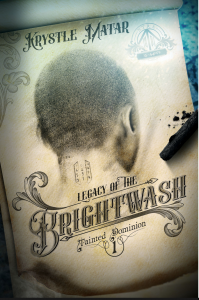 Legacy of the Brightwash is the debut novel by Krystle Matar, and it’s an excellent start to a richly detailed world. Legacy of the Brightwash follows Tashué Blackwood, a former war hero, now an officer of the Authority. It is his duty to make sure the Tainted—people with powers beyond those of regular humans—are monitored. They need to work in approved ways for the Dominion, stay under the supervision of Tashué and his colleagues, and may only marry and have children with approved people.
Legacy of the Brightwash is the debut novel by Krystle Matar, and it’s an excellent start to a richly detailed world. Legacy of the Brightwash follows Tashué Blackwood, a former war hero, now an officer of the Authority. It is his duty to make sure the Tainted—people with powers beyond those of regular humans—are monitored. They need to work in approved ways for the Dominion, stay under the supervision of Tashué and his colleagues, and may only marry and have children with approved people.
Read the full review here
About Krystle MaterKrystle Matar has been writing for a long time, but things got serious when Tashué Blackwood walked into her life, an amber-eyed whirlwind. When she isn’t arguing with him or any of his friends, she parents and farms. She has a lot of children and even more animals and one very excellent husband. She is currently working on lots of stories set in the Dominion. She expects to exist in this universe for awhile.
Read Legacy of the Brightwash by Krystle MaterHiron Ennes, Author of LeechNominated by Ryan Howse-Meister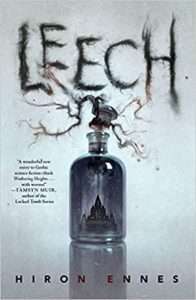 In Verdira, a brutal winter encroaches as a replacement arrives for a doctor who just died. Both the dead doctor and the replacement are part of The Institute, where doctors are trained; they also both share the same hive-mind. Trained doctors are almost exclusively from The Institute, and the entity inside can take over as many bodies as it believes it needs. But the fact that the replacement has no idea how the original doctor died is cause for concern—what could have happened that the hive mind wasn’t aware of? As Leech continues, the paranoia ramps up as nearly every character displays something that could suggest infection. It comes to a head in one of the creepiest, most unnerving scenes. It’s a bloody mix of body horror and vile character dynamics. As the climax hits, paranoia falls away for something both stranger and stronger. It’s a great ending to this fantastic, weird, unsettling novel.
In Verdira, a brutal winter encroaches as a replacement arrives for a doctor who just died. Both the dead doctor and the replacement are part of The Institute, where doctors are trained; they also both share the same hive-mind. Trained doctors are almost exclusively from The Institute, and the entity inside can take over as many bodies as it believes it needs. But the fact that the replacement has no idea how the original doctor died is cause for concern—what could have happened that the hive mind wasn’t aware of? As Leech continues, the paranoia ramps up as nearly every character displays something that could suggest infection. It comes to a head in one of the creepiest, most unnerving scenes. It’s a bloody mix of body horror and vile character dynamics. As the climax hits, paranoia falls away for something both stranger and stronger. It’s a great ending to this fantastic, weird, unsettling novel.
Read the full review here
About Hiron EnnesHiron Ennes is a writer, musician, and student of medicine based in the Pacific Northwest. Their areas of interest include infectious disease, pathology, and anti-capitalist healthcare reform. When they’re not hunched over a microscope or Word document they can be found playing in the snow or playing the harp (though usually not at the same time). They’re queer in every sense of the word, and they really want to pet your dog.
Read Leech by Hiron EnnesH.L. Tinsley, Author of The Hand that Casts the BoneNominated by Chris Haught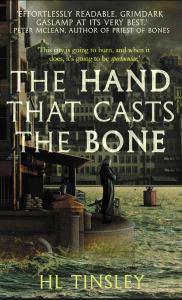 The Hand that Casts the Bone takes traditional grimdark elements like morally grey characters, ambiguous decisions, and brutal violence and applies them to a Gaslamp atmosphere with Gothic undertones to create something wholly unique. Tinsley’s bleak world sets the stage for the themes of choice, hope, and redemption to play out in varying ways, keeping the reader on their toes at every turn:
The Hand that Casts the Bone takes traditional grimdark elements like morally grey characters, ambiguous decisions, and brutal violence and applies them to a Gaslamp atmosphere with Gothic undertones to create something wholly unique. Tinsley’s bleak world sets the stage for the themes of choice, hope, and redemption to play out in varying ways, keeping the reader on their toes at every turn:
“Each person has a threshold at which point, when confronted with things they do not want to face, must choose between fight and flight.”
Read the full review here
About H.L. TinsleyH.L. Tinsley is the pen name of professional blogger and creative writer Holly Tinsley. Based in the UK, she is a published author of fantasy, Gothic horror and grimdark fiction as well as a regular contributor to gaming, tabletop RPG, and pop culture websites and blogs. Her work has been featured in Horla Magazine online, An Hour of Writes, and the British Fantasy Society journal New Horizons.
Read The Hand that Casts the Bone by H.L. TinsleyZamil Akhtar, Author of Gunmetal GodsNominated by Tom Smith
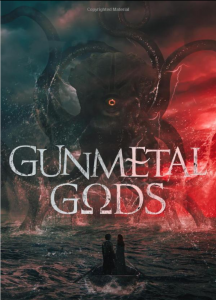 Gunmetal Gods is a novel focused on a fantastical analog to the Crusades. It’s told through dual points of view of both Kevah, a janissary soldier, and Micah the Metal, a paladin. Kevah’s an old man now, forced out of retirement by his Shah for one last job. Micah is looking to take over Kostony, the holy city and seat of the janissaries. The main characters in Gunmetal Gods have a fascinating dynamic with one another. They both have similar mysteries surrounding them, both pieces in the same puzzle. Both want to protect the city of Kostony from the other. There are several other pieces that fit together as the story goes on and revelations unfold.
Gunmetal Gods is a novel focused on a fantastical analog to the Crusades. It’s told through dual points of view of both Kevah, a janissary soldier, and Micah the Metal, a paladin. Kevah’s an old man now, forced out of retirement by his Shah for one last job. Micah is looking to take over Kostony, the holy city and seat of the janissaries. The main characters in Gunmetal Gods have a fascinating dynamic with one another. They both have similar mysteries surrounding them, both pieces in the same puzzle. Both want to protect the city of Kostony from the other. There are several other pieces that fit together as the story goes on and revelations unfold.
Read the full review here
About Zamil AkhtarZamil Akhtar is an indie science fantasy author and blogger living a location-free lifestyle. He can be found in Boston, Dubai, or Manila depending on the time of year. Of Pakistani heritage, he grew up in the Middle East and moved to western Massachusetts when he was thirteen, and his varied upbringing colors his fiction. He has a BBA in Marketing from the University of Massachusetts and an MA in International Relations from Johns Hopkins University. His loves are videogames, science fiction and fantasy novels, HBO dramas, and Southeast Asia.
Read Gunmetal Gods by Zamil AkhtarClay Harmon, Author of Flames of MiraNominated by Aaron Jones
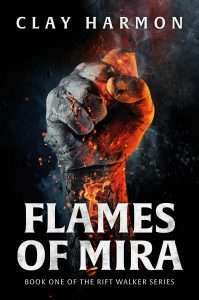
Set in a subterranean volcanic world beneath a frozen wasteland, Flames of Mira follows Ig, a powerful elemental enslaved by a ruthless ruler. Flames of Mira is dark, tense, and full of action. It is perfect for readers who like their fantasy full of morally grey characters battling with moral dilemmas in a unique world that just seems to bring pain to both the powerful and the weak. Ig had undergone a life-threatening trial binding chemical elements to his body and now works in secret as an enforcer for corrupt Magnate Sorrelo Adriann. He is cursed with a flesh binding magic that will kill him if he disobeys the cruel ruler. When Sorrelo is overthrown in a coup, Ig is forced to make difficult choices and attempt to escape his flesh binding as a battle for the throne begins.
Read the full review here
About Clay HarmonClay Harmon grew up outside Yosemite National Park and started writing in high school on Star Wars fanfiction websites. He’s worked at Barnes & Noble and received his degree in marketing at CSU Fresno. He now works for a tech company, and in his off-time lifts weights, loses at video games, and terrorizes his cats.
Read Flames of Mira by Clay HarmonShauna Lawless, Author of The Children of Gods and Fighting MenNominated by Fiona Denton
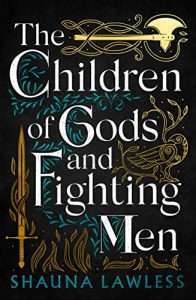
The Children of Gods and Fighting Men is a fantastic novel and as debut I think Lawless has knocked it out of the park. Lawless has seamlessly woven Irish mythology and history together and created a well-structured and paced novel which can be enjoyed if you know nothing about the history or folk lore of Ireland. But if you do, her attention to historical detail and accuracy adds to the pleasure of reading The Children of Gods and Fighting Men. The fantasy elements are low magic, and use the Irish legends of the Fomorians, hostile supernatural beings, and their rivals the Descendants of the Tuatha Dé Danann.
Read the full review here
About The Children of Gods and Fighting MenShauna Lawless is an author and lover of Irish history and mythology. She lives in County Down with her husband, three boys, and her loveable sproodle, Chewy.
Read The Children of Gods and Fighting MenA.K. Larkwood, Author of The Unspoken NameNominated by Brigid Flanagan
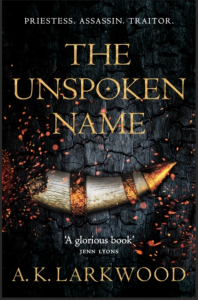
A.K Larkwood’s debut novel, The Unspoken Name, the first novel in The Serpent’s Gate series, is all about choice. There is absolute power in hitting bottom; you have faced death, the end, and come out on the other side. After that, the world is open to you choice-wise. Is the power of choice enough to build a substantial epic series? The answer is a resounding yes! Choice is one of the most primal things humans can make. Your choices make or break your future. This debut novel is excellent and worth reading, even if it is just for the world-building alone.
Read the full review
About A.K. LarkwoodA.K. Larkwood is a science fiction and fantasy writer and enthusiast. She studied English at St. John’s College, Cambridge. She has worked in higher education and media relations, and she is now studying law. She lives in Oxford, England, with her wife and a cat.
Read The Unspoken Name by A.K. LarkwoodC.L. Clark, Author of The UnbrokenNominated by Fabienne Schwizer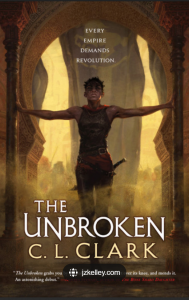 The Unbroken is modern grimdark at its finest. Epic in scale, set in a world fraught with discord at all fronts and centered around Touraine, a soldier compelled to fight for the conquering army of her home, and Luca, the conquering princess (though she ain’t very princessy). If old-school grimdark is what brought you to this site, then The Unbroken is the sort of book you should strongly consider picking up from the up-and-coming generation of writers.
The Unbroken is modern grimdark at its finest. Epic in scale, set in a world fraught with discord at all fronts and centered around Touraine, a soldier compelled to fight for the conquering army of her home, and Luca, the conquering princess (though she ain’t very princessy). If old-school grimdark is what brought you to this site, then The Unbroken is the sort of book you should strongly consider picking up from the up-and-coming generation of writers.
Part of Grimdark Magazine’s Ten Queer Books to Kickstart Your Reading
About C.L. ClarkC.L. Clark is the author of The Unbroken, the first book in the Magic of the Lost trilogy. She graduated from Indiana University’s creative writing MFA and was a 2012 Lambda Literary Fellow. She’s been a personal trainer, an English teacher, and an editor, and is some combination thereof as she travels the world. When she’s not writing or working, she’s learning languages, doing P90something, or reading about war and [post-]colonial history. She’s a former co-editor of the Hugo-nominated and British Fantasy Award-winning PodCastle, and her work has appeared in Uncanny, Beneath Ceaseless Skies, Fantasy Magazine and more.
Read The Unbroken by C.L. ClarkCameron Johnston, Author of The Maleficent SevenNominated by Chris Napier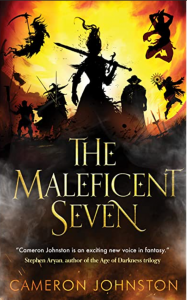 The Maleficent Seven from author Cameron Johnston is an interesting, bloody, action-packed novel that starts big and doesn’t let up. Starting at a point where most novels would end, The Maleficent Seven brings a bunch of grim, weary bastards together to protect a town threatened by the march of a seemingly unstoppable army of fanatics. Humor, blood, and a lot of bad people doing bad things – The Maleficent Seven is a book you will not want to miss.
The Maleficent Seven from author Cameron Johnston is an interesting, bloody, action-packed novel that starts big and doesn’t let up. Starting at a point where most novels would end, The Maleficent Seven brings a bunch of grim, weary bastards together to protect a town threatened by the march of a seemingly unstoppable army of fanatics. Humor, blood, and a lot of bad people doing bad things – The Maleficent Seven is a book you will not want to miss.
Read the full review here
About Cameron JohnstonCameron Johnston is the British Fantasy Award and Dragon Awards nominated author of dark fantasy novels, The Traitor God, God of Broken Things, and The Maleficent Seven. He is a swordsman, a gamer, and an enthusiast of archaeology, history, and mythology. He loves exploring ancient sites and camping out under the stars by a roaring fire.
Read The Maleficent Sevent by Cameron JohnstonMike Shackle, Author of A Fool’s HopeNominated by Rai Furniss-Greasley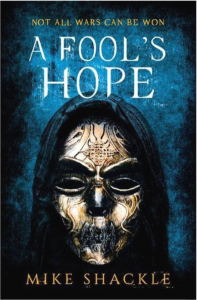 If Shackle was just finding his voice as an author in We Are the Dead, he has really excelled and polished his craft in the sequel. A Fool’s Hope knows precisely what sort of beast it wants to be from the very beginning, and it doesn’t disappoint fans of The Last War who have been looking forward to this novel. A Fool’s Hope is gritty, thrilling, with well-crafted and surprisingly likeable characters (for the most part), and it progresses the overall narrative in fine fashion. The Last War is a series that many more fans of grimdark and dark fantasy should check out.
If Shackle was just finding his voice as an author in We Are the Dead, he has really excelled and polished his craft in the sequel. A Fool’s Hope knows precisely what sort of beast it wants to be from the very beginning, and it doesn’t disappoint fans of The Last War who have been looking forward to this novel. A Fool’s Hope is gritty, thrilling, with well-crafted and surprisingly likeable characters (for the most part), and it progresses the overall narrative in fine fashion. The Last War is a series that many more fans of grimdark and dark fantasy should check out.
Read the full review here
About Mike ShackleOriginally from London, Mike Shackle has called Hong Kong, Singapore, Beijing, New York,
and Dubai his home over the years before settling down with his family in Vancouver. In that time, he’s sold washing machines, cooked for royalty, designed a few logos, and made a lot of ads. Ideally, he’s happiest daydreaming over a cup of tea.
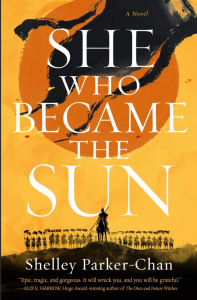 2021 was the year of the sapphic trifecta – The Jasmine Throne by Tasha Suri, She Who Became the Sun by Shelley Parker-Chan and The Unbroken by C.L. Clark. She Who Became the Sun by Shelley Parker-Chan is an amazing Chinese-inspired military fantasy with grimdark leanings. Their next book and sequel, He Who Drowned the World, is due out in 2023.
2021 was the year of the sapphic trifecta – The Jasmine Throne by Tasha Suri, She Who Became the Sun by Shelley Parker-Chan and The Unbroken by C.L. Clark. She Who Became the Sun by Shelley Parker-Chan is an amazing Chinese-inspired military fantasy with grimdark leanings. Their next book and sequel, He Who Drowned the World, is due out in 2023.
Check out Grimdark Magazine’s Ten Queer Books to Kickstart Your Reading
About Shelley Parker-ChanShelley Parker-Chan (she/they) is an Asian-Australian former diplomat and international development adviser who spent nearly a decade working on human rights, gender equality and LGBT rights in Southeast Asia. Named after the Romantic poet, Shelley Parker-Chan was raised on a steady diet of Greek myths, Arthurian legend and Chinese tales of suffering and tragic romance. Parker-Chan’s writing owes more than a little to all three. In 2017 they were awarded an Otherwise (Tiptree) Fellowship for a work of speculative narrative that expands our understanding of gender.
Read She Who Became the Sun by Shelley Parker-ChanHannah Kaner, Author of GodkillerNominated by James Tivendale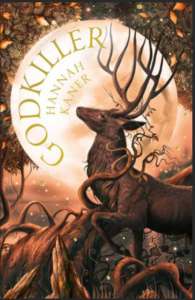 Kissen’s family were killed by zealots of a fire god. Now, she makes a living killing gods, and enjoys it. That is until she finds a god she cannot kill: Skedi, a god of white lies, has somehow bound himself to a young noble, and they are both on the run from unknown assassins. Joined by a disillusioned knight on a secret quest, they must travel to the ruined city of Blenraden, where the last of the wild gods reside, to each beg a favor. Pursued by demons, and in the midst of burgeoning civil war, they will all face a reckoning – something is rotting at the heart of their world, and only they can be the ones to stop it.
Kissen’s family were killed by zealots of a fire god. Now, she makes a living killing gods, and enjoys it. That is until she finds a god she cannot kill: Skedi, a god of white lies, has somehow bound himself to a young noble, and they are both on the run from unknown assassins. Joined by a disillusioned knight on a secret quest, they must travel to the ruined city of Blenraden, where the last of the wild gods reside, to each beg a favor. Pursued by demons, and in the midst of burgeoning civil war, they will all face a reckoning – something is rotting at the heart of their world, and only they can be the ones to stop it.
Read the full review here
Part of Grimdark Magazine’s The SFF Books We Can’t Wait to Read in 2023
About Hannah KanerHannah Kaner is a Northumbrian writer living in Scotland. She works as a senior digital consultant in Edinburgh, delivering digital healthcare, tools, and services for the public sector. She has a first class degree in English from Pembroke College, Cambridge, and a Masters of Science with distinction from the University of Edinburgh. She is inspired by world mythologies, angry women, speculative fiction, and the stories we tell ourselves about being human.
Read Godkiller by Hannah KanerGaurav Mohanty, Author of Sons of DarknessNominated by Elizabeth Tabler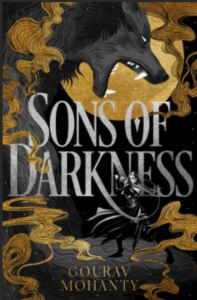 Bled dry by violent confrontations thwith e Magadhan Empire, the Mathuran Republic simmers on the brink of oblivion. The Republic’s Leaders, Krishna and Satyabhama, have put their plans in motion within and beyond its blood-soaked borders, to protect it from annihilation. But theymwill soon discover that neither gold nor alliances last forever. They are, however, not the only players in this game. Mati, Pirate-Princess of Kalinga, must mend her ways if she is to be a good wife. But old habits die hard, especially when one habitually uses murder to settle scores. Karna, the gifted son of a lowborn charioteer, hopes to bury his brutal past, but finds that life is not generous in offering second chances. The crippled hero-turned-torturer Shakuni struggles in the maze of daggers, that is politics, leaving little time for him to plot the revenge he craves.
Bled dry by violent confrontations thwith e Magadhan Empire, the Mathuran Republic simmers on the brink of oblivion. The Republic’s Leaders, Krishna and Satyabhama, have put their plans in motion within and beyond its blood-soaked borders, to protect it from annihilation. But theymwill soon discover that neither gold nor alliances last forever. They are, however, not the only players in this game. Mati, Pirate-Princess of Kalinga, must mend her ways if she is to be a good wife. But old habits die hard, especially when one habitually uses murder to settle scores. Karna, the gifted son of a lowborn charioteer, hopes to bury his brutal past, but finds that life is not generous in offering second chances. The crippled hero-turned-torturer Shakuni struggles in the maze of daggers, that is politics, leaving little time for him to plot the revenge he craves.
Alongside a cast of sinister queens, naive kings, pious assassins and predatory priests, these dubious heroes will converge where the Son of Darkness is prophesied to rise and break the World, even as forgotten Gods prepare to play their hand.
Check out more South Asian and Indian Subcontinental Stories You Should Be Reading on Before We Go Blog
About Gaurav MohantyAuthor, lawyer, standup comedian, papercut survivor, pretend swordfighter, recovering burgers addict. As evident, his life has many tabs open. Though he was doing well as a lawyer in Mumbai, he is now pursuing the infinitely more unattainable dream of being the first epic fantasy novelist of India. A connoisseur of mythologies and momos, he enjoys channeling The Rock and writing author bios in third person. Sons of Darkness is Gourav’s first novel. Give it a shot for the poor author owes considerable gold to goblins.
Read Sons of Darkness by Gaurav MohantyT.R. Napper, Author of 36 StreetsNominated by Adrian Collins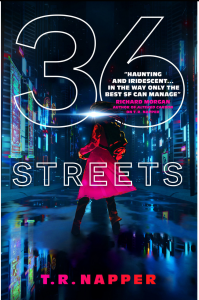 In T.R. Napper’s debut novel, 36 Streets, Lin Thi Vu is a bounty hunter working for the most feared gangster in Ha Noi. She works her trade in a cyberpunk future Vietnam where the Chinese have invaded and taken over the region and the people of Ha Noi and the 36 streets are pawns butchered between the Chinese military and the Viet Minh. Tired of doing jobs for the Chinese rooting out Viet Minh guerrillas, Lin requests a different type of job. Her boss instructs her to act the part of a private detective for a westerner. Only her job isn’t just to do the job, it’s to take all of the westerner’s money.
In T.R. Napper’s debut novel, 36 Streets, Lin Thi Vu is a bounty hunter working for the most feared gangster in Ha Noi. She works her trade in a cyberpunk future Vietnam where the Chinese have invaded and taken over the region and the people of Ha Noi and the 36 streets are pawns butchered between the Chinese military and the Viet Minh. Tired of doing jobs for the Chinese rooting out Viet Minh guerrillas, Lin requests a different type of job. Her boss instructs her to act the part of a private detective for a westerner. Only her job isn’t just to do the job, it’s to take all of the westerner’s money.
Read the full review here
About T.R. NapperT. R. Napper is also a former diplomat and aid worker, having lived and worked throughout Southeast Asia for over a decade delivering humanitarian programs. Napper is a scholar of East and Southeast Asian literature, and has a creative writing doctorate in Noir, Cyberpunk, and Asian Modernity.
Read 36 Streets by T.R. NapperKian N. Ardalan, Author of Eleventh CycleNominated by John Mauro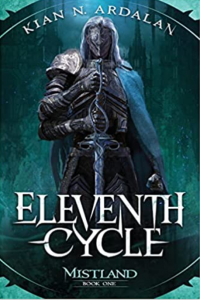 With its epic worldbuilding, hauntingly beautiful aesthetic, and well-realized protagonists, Eleventh Cycle is a tour de force of grimdark fantasy and a bold statement from emerging indie author Kian N. Ardalan. The novel takes place in the mist-encircled land of Minethria as the prophesied Eleventh Seed is born. This offspring of the Elder King may, perhaps, serve as savior to the mortal beings of this war-torn land. Eleventh Cycle achieves Brandon Sanderson-level worldbuilding, but with a murkier tone and a more nuanced execution. What makes Eleventh Cycle so effective is that this darkness is balanced with a big heart. Ardalan shares Sanderson’s talent at creating empathetic, broken characters, bringing a deeply personal focus to a vast,mcomplex world. At its core, Eleventh Cycle is a character-driven fantasy featuring four mortal protagonists living in a land that is indifferent to their struggles.
With its epic worldbuilding, hauntingly beautiful aesthetic, and well-realized protagonists, Eleventh Cycle is a tour de force of grimdark fantasy and a bold statement from emerging indie author Kian N. Ardalan. The novel takes place in the mist-encircled land of Minethria as the prophesied Eleventh Seed is born. This offspring of the Elder King may, perhaps, serve as savior to the mortal beings of this war-torn land. Eleventh Cycle achieves Brandon Sanderson-level worldbuilding, but with a murkier tone and a more nuanced execution. What makes Eleventh Cycle so effective is that this darkness is balanced with a big heart. Ardalan shares Sanderson’s talent at creating empathetic, broken characters, bringing a deeply personal focus to a vast,mcomplex world. At its core, Eleventh Cycle is a character-driven fantasy featuring four mortal protagonists living in a land that is indifferent to their struggles.
Read the full review here and our recent interview with Kian N. Ardalan here
About Kian N. ArdalanKian N. Ardalan was born in Dusseldorf, Germany to Persian parents. When he wasn’t playing video games, reading novels, or trying to convince his parents to watch that R-rated movie about vampires and werewolves, he delved into fantasy worlds of his own making.
Read Eleventh Cycle by Kian N. ArdalanThe post Rising Stars of Grimdark SFF 2023 appeared first on Grimdark Magazine.
REVIEW: The Daughters of Izdihar by Hadeer Elsbai
Magic. Suffrage. Revolution. These are the three things at the centre of Hadeer Elsbai’s debut The Daughters of Izdihar. Set in an Egyptian-inspired world, probably around the turn of the twentieth century in terms of comparison to our society, this story is drawn around two young women: Nehal, a spoiled aristocrat who wants to learn magic and join the revolutionary movement, and Giorgina, a bookseller in love with an unsuitable man, entangled with both magic and revolution. When they meet, the two realise that they have far more in common than their connection to the same man – Nehal’s unwanted husband and Giorgina’s lover.
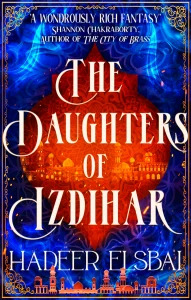 Hadeer Elsbai weaves a story of revolution big and small, of women looking to find their place in the world as they are in their own lives. The Daughters of Izdihar is wonderful, compelling and real – making her an author to watch out for. I especially loved the characters in this. Both Nehal and Giorgina seemed rather shallow and simply drawn when the reader first meets them, but the more the story progresses, the more substance gets put on them. They are fleshed out as they grow, their portrayal mirroring their character arcs. And it is their story. They are the architects of the rise and fall of the story beats. They may not be the only important characters – or even always at the centre of the plot – but they are the catalysts, they are the moving force, the soul of The Daughters of Izdihar.
Hadeer Elsbai weaves a story of revolution big and small, of women looking to find their place in the world as they are in their own lives. The Daughters of Izdihar is wonderful, compelling and real – making her an author to watch out for. I especially loved the characters in this. Both Nehal and Giorgina seemed rather shallow and simply drawn when the reader first meets them, but the more the story progresses, the more substance gets put on them. They are fleshed out as they grow, their portrayal mirroring their character arcs. And it is their story. They are the architects of the rise and fall of the story beats. They may not be the only important characters – or even always at the centre of the plot – but they are the catalysts, they are the moving force, the soul of The Daughters of Izdihar.
If I did have to draw comparisons, I would say the closest is a cross between C.L. Clark’s The Unbroken and P. Djeli Clark’s A Master of Djinn – both excellent books in their own right. As these comps show, the setting is crucial to The Daughters of Izdihar. Inspired by late nineteenth and early twentieth century Egypt, the story is rooted in its cultural background, interacting with the setting as much as with individual characters, using it as a character itself. One thing I was curious about – and this may well be discussed in the next book – is how the setting of The Daughters of Izdihar fits into its own cultural context. I wondered if the suffragist movement was happening in reaction to other movements or as a pioneering one, if there was communication across cultural divides.
As you can see, I adored The Daughters of Izdihar. An excellent debut with strong characters, smart ideas and revolutionary energy motivating readers to think about what they could do to improve their own surroundings. I can’t wait to see Hadeer Elsbai be successful in the future.
Read The Daughters of IzdiharThe post REVIEW: The Daughters of Izdihar by Hadeer Elsbai appeared first on Grimdark Magazine.
January 6, 2023
REVIEW: The Witch and the Tsar by Olesya Salnikova Gilmore
The Witch and the Tsar is Olesya Salnikova Gilmore’s intriguing debut. It has been published in the US for a few months, but the UK edition was just released in December – both have their own gorgeous covers, doing the story justice. The Witch and the Tsar is historical fantasy, weaving the complex stories around Baba Yaga into the establishment of the Tsardom in Russia – the story is largely set during the reign of Ivan IV (Ivan the Terrible), the first Tsar of Russia. It is a well-written and compelling story, focused on atmosphere. And that makes The Witch and the Tsar a perfect read for this time of year.
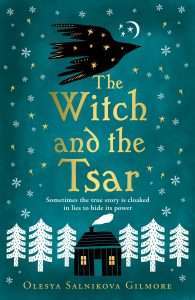 I loved seeing more of Baba Yaga – and having her be a complex and morally ambiguous character, struggling with her role in the world and society. We tend to only ever hear a very one-sided portrayal of her as the hag living in the house with chicken legs, and this Yaga is far more than that. She is a woman, a mother and a lover. She cares and she fights, she tries to help but also pushes boundaries and struggles. I also found the way the story was embedded in its historical context worked well. It wasn’t overloaded with minute detail, but rich enough to evoke a lush atmosphere, with information in all of the right places.
I loved seeing more of Baba Yaga – and having her be a complex and morally ambiguous character, struggling with her role in the world and society. We tend to only ever hear a very one-sided portrayal of her as the hag living in the house with chicken legs, and this Yaga is far more than that. She is a woman, a mother and a lover. She cares and she fights, she tries to help but also pushes boundaries and struggles. I also found the way the story was embedded in its historical context worked well. It wasn’t overloaded with minute detail, but rich enough to evoke a lush atmosphere, with information in all of the right places.
What I felt didn’t work quite as well was the pacing and with it, character development in its deeper nuances. As the book spans a long period of time, the story taking place over the course of decades, with Yaga being ageless before that, the individual moment is given less significance in the scheme of things. I found that that led to uneven pacing and less personal connection throughout the story. Spending more time on a limited timespan would have helped even this out and created a more coherent story. I understand that this followed Yaga throughout the course of Ivan’s reign, and chronicled their ongoing relationship and interactions – but to me, it lost narrative tension in this broad remit, and I wished it had been more concerned with a smaller scale story, but fleshed it out more.
While I enjoyed reading this a lot, and found a lot of the individual elements worked really well, as a whole, not everything worked together perfectly. Pacing and tension was at times awkward, though the story was still compelling and the atmosphere made up for a lot. There was a clear focus on Yaga and her character to the detriment of others due to the scale of the project. The Witch and the Tsar is certainly a promising debut, by a writer to watch. It’s not a perfect book, but one to go into with awareness of its flaws and one that will work well for readers who love vibes and atmosphere over pacy plot.
Read The Witch and the TsarThe post REVIEW: The Witch and the Tsar by Olesya Salnikova Gilmore appeared first on Grimdark Magazine.
January 5, 2023
REVIEW: Sweet Silver Blues by Glenn Cook
Glen Cook is an author that I intellectually know I should love but just doesn’t jive with my style. At least, that’s what I thought about him having tried and failed to read the Black Company three times. It was excellent world-building but, for some reason, I wasn’t able to appreciate it the way I wanted to so I ended up dropping the series. Still, I was attracted to the prospect of another supernatural PI story. I’m a huge Dresden Files fan and the idea of a normal non-magical PI in a fantasy world seemed a cool reversal.
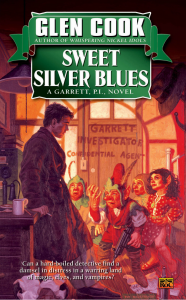 The premise is Garrett is a former Marine in the service of the kingdom of Karenta that survived his term of service before becoming a private investigator.
The premise is Garrett is a former Marine in the service of the kingdom of Karenta that survived his term of service before becoming a private investigator.
A former friend of his is killed in an accident and leaves his vast fortune to a mysterious woman. Named executor of their estate, Garrett is compelled by the substantial fee he’s offered to go back to war-torn Cantard in order to find her.
For the most part, I very much enjoyed the book and the whole idea of a detective novel in a fantasy land is something I’m absolutely down for. I mentioned that I felt like Dragon Age 2 would have been improved greatly if instead of being a nobleman, Hawke had ended up opening a private Inquisitive service. Anyway, the parts about investigating Kayean Kronk’s mysterious disappearance as well as dealing with the late Denny Tate’s partners are the best in the book.
Unfortunately, the final third of the book is a bit of a let down as it goes from being a detective novel to being more straight action fantasy with battles against unicorns, vampire hunting, and other fights to the death that are less interesting. There’s also the fact women aren’t terribly well-represented in the book. Rose Tate, one of a pair of beautiful redheaded gnomish sisters, threatens to tell everyone Garrett sexually assaulted her at one point. Which, later on, he gets her back for along with a beating from one of her goons by sending a man to kidnap her then spank her naked in public. Yeah. Yikes.
I was also somewhat disappointed with the fact we never get much in the way of conversation with Kayean Tate. Despite being someone who is the focus of numerous interesting storylines, she says all of two words in the novel. I feel like conversations with the protagonist would have been a lot more interesting than stabbing vampires through the heart with unicorn horns. Which, compared to my fourteen-year-old-self’s fantasy tastes, must sound like blasphemy.
Overall, Glen Cook is a fantastic author and I really love this peanut butter and jelly sandwich he’s made of genres. Unfortunately, I really wish he’d stuck with the PI elements of the book heavier than he did. He sort of wandered off into, admittedly, very well written action scenes. I will probably read the rest of the series but I hope the handling of the feminine sex gets better.
Read Sweet Silver Blues by Glenn CookThe post REVIEW: Sweet Silver Blues by Glenn Cook appeared first on Grimdark Magazine.



